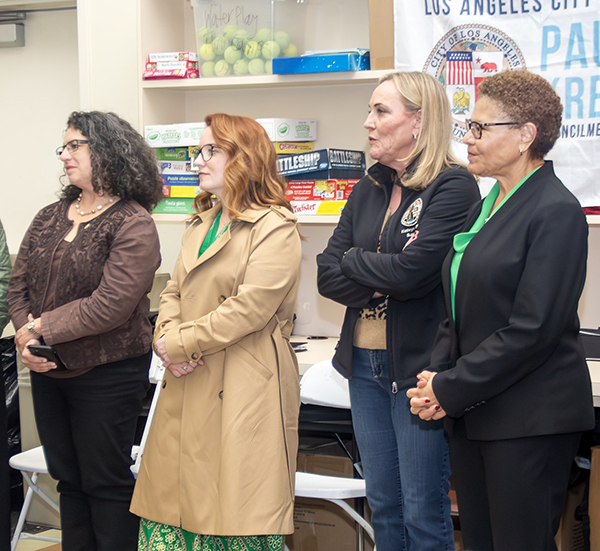Wave Wire Services
LOS ANGELES — More time is needed to finalize details of an audit before a judge can give final approval of city homeless programs, and another hearing is scheduled March 22 in downtown Los Angeles.
A U.S. District judge came closer March 18 to signing off on a court-monitored, independent audit of homeless-related expenditures by the city, including Mayor Karen Bass’ signature Inside Safe initiative and other efforts to close encampments and find shelter for unhoused residents.
Although there is an agreement in principle to move forward on the audit, U.S. District Judge David Carter said more time is needed before he can give final approval to the forensic accounting of city homeless programs, the judge said.
Carter has expressed frustration regarding the accounting of public funds to battle the homelessness crisis, and has repeatedly mentioned from the bench that $600 million was distributed to city programs in years past — before Bass was elected mayor in 2022 — without proper accounting.
Bass and City Council President Paul Krekorian attended the March 18 court session, agreeing with Carter about the need for transparency and promising that the city would provide and make public detailed invoices for work being done in connection with the homeless. The courtroom audience burst into applause at the mayor’s assurance.
The discussion came as a result of a motion filed by lawyers for the L.A. Alliance for Human Rights, which accuses the city of failing to live up to the terms of an April 2022 settlement agreement to clear homeless encampments and create shelter beds for those living on the streets.
The alliance is demanding that the city pay a nearly $6.4 million fine for what it alleges is a lack of transparency and failure to reduce homeless encampments within deadlines set in the settlement.
In March 2020, the alliance of downtown business owners and residents, sued the city and county of Los Angeles to compel elected officials to rapidly address the homelessness crisis, especially in light of the COVID-19 pandemic.
During the March 18 hearing, Carter commended Bass and Krekorian for representing “the first city that’s undertaken that transparency.”
The audit recommended by Bass and Krekorian at a previous hearing was agreed to by the L.A. Alliance for Human Rights and interveners. Va Lecia Adams Kellum, CEO of the Los Angeles Homeless Services Authority, also committed via phone to begin requiring providers to show substantial documentation of their work within two weeks.
“Since Day 1, Mayor Bass has moved with urgency to save lives and bring unhoused Angelenos off the streets leading to thousands more Angelenos coming inside last year than the year before,” Zach Seidl, the city’s deputy mayor of communications, said in a statement.
“Mayor Bass has long led calls for accountability, transparency and outcome measures regarding homelessness services and the cost incurred by the city, which is why the mayor suggested an independent audit.”
In a letter to the court last week, Councilwoman Monica Rodriguez called for an independent audit of both city and county homelessness expenditures.
“Until we can verify what each level of government is doing to solve the greatest humanitarian crisis of our time, I cannot say with certainty that we have an efficient and effective operation free of redundancies,” she wrote.
In the lawsuit, the plaintiffs demanded the immediate creation of shelter and housing to get people off the streets, services and treatment to keep the unhoused sheltered, and regulation of public spaces to make streets, sidewalks and parks safe and clean.
In the eventual settlement, it was agreed that the city would reduce encampments, add more shelter beds, establish deadlines and goals to document its progress, and return public spaces to their intended uses.
The county’s settlement agreement would create 3,000 treatment beds for unsheltered people with mental illnesses and addictions, subsidize 450 “Board and Care” beds, and establish deadlines and targets to document its efforts.
According to the L.A. Alliance, the settlements will result in 3,500 mental health and treatment beds and 19,700 beds for people experiencing homelessness, including 6,700 beds focused on helping those living near freeways and underpasses.
Although the lawsuit originally appeared to target the Skid Row area, the city and county’s agreements cover all of Los Angeles and are not limited to downtown streets. The current L.A. Alliance motion singles out Skid Row area and two locations in Highland Park as requiring urgent action.
Carter approved the settlements on the condition that he closely oversee the city and county’s progress in meeting their deadlines and goals. An April 4 hearing was also set to discuss the county’s efforts to meet its deadlines.
The judge has not ruled on the L.A. Alliance motion recommending that the city pay the multimillion-dollar fine but indicated he is “uncomfortable” with the proposed sanction.









